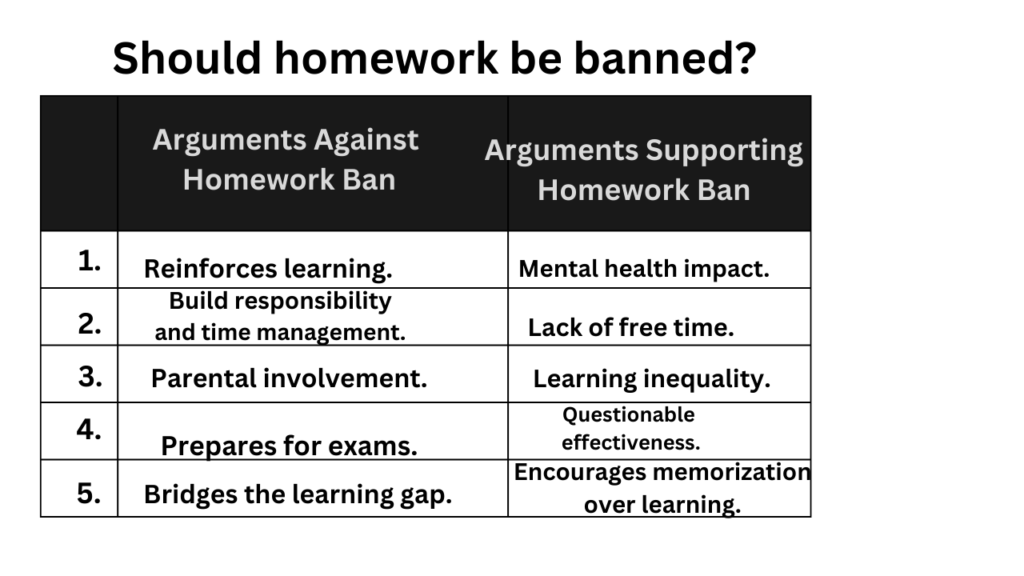Homework is a school task given to the students to do at home. It reinforces learning, builds responsibility in the students, helps them learn time management, prepares them for exams, and bridges the learning gap. However, if a lot of homework is given it may affect the mental health of children, develop learning inequality, or curtail their free time.

Arguments against homework ban:
1. Reinforces Learning
Students can do schoolwork by staying in their comfort zone at home. The concepts taught in the class are reinforced when students do schoolwork at home. They can take notes and read them. They can practice similar mathematical problems that are taught in school. Therefore, it results in reinforcing learning. Reinforcement is important for learning because behavioral response is conditioned by reinforcement.
2. Build Responsibility and Time Management
Schoolwork helps students develop discipline and organization. They prepare a schedule and try to stick to it. Every day they take time to do their assignments. The onus of doing schoolwork lies on their shoulders. This also helps in clearing doubts. Students learn how to utilize their time efficiently. They also learn to do their schoolwork on time. They become aware that they cannot leave things to the last minute. Life skills like discipline and perseverance are developed by following the schoolwork regime. Schoolwork helps students develop discipline and organization. They prepare a schedule and try to stick to it.

3. Parental Involvement
Parental involvement is crucial in a child’s life. At home parents often help their children to do their schoolwork. Parents get a chance to interact and engage with the child. When they go to parents’ teacher meetings in school they know the progress of their child. While doing homework with parents’ support, they develop good mutual understanding with their wards. This can significantly improve their academic performance as it can lead to higher grades.

4. Prepares for exams
Preparing for exams is a daunting task for most of the students. The key is if they do their assignments diligently, they will not require last-minute cramming. Regular assignments help students prepare for exams. They can practice potential exam questions by preparing for exams. A sense of accountability for their learning is developed among students. They can identify their weak areas and focus on them for improved performance.

5. Bridges the Learning Gap
At school students grasp the concepts of different subjects. However, one cannot ignore the benefits of revising topics. Students can use the amount of time available by practicing and revising what they learned in school. This helps to bridge the learning gap. At home, they can take the help of their parents or tuition teachers and ask questions if they have doubts. This is fruitful for weaker students to catch up with their studies.
Arguments Supporting Homework Ban:
1. Mental Health Impact
Excessive schoolwork increases stress and anxiety among students. Students are often worried about completing their schoolwork on time. This increases the burden on them. They stop enjoying the process of doing homework. Because of stress, they forget the things learned in the classroom. At home, children might have some unaddressed personal issues. For example, their parents might not be educated or they might not have enough money to hire a tuition teacher. Hence, they may not get the required support further aggravating their tensions.
2. Lack of Free Time
Children often get caught in the vicious cycle of time. They have to take out time for schoolwork every day. It reduces the time for extracurricular activity and family bonding. This impacts their cognitive development. Sometimes they don’t get enough sleep to regain the energy in their growth years. This also hampers creativity and imagination in them. Hobbies gives kids the chance to do what they like. When they do schoolwork they don’t get time to spend on hobbies.
3. Learning Inequality
All the students are treated equally in school and the uniform brings uniformity. However, when the same students go home, some don’t have access to resources like quiet spaces and the internet. The parents of some students are not financially stable. During the nationwide lockdown due to the COVID-19 pandemic, many children suffered as they did not have access to mobile phones or the internet at home. Such differences are starker between rich and poor families. Due to this learning inequality props up among students.
4. Questionable Effectiveness
Research indicates that homework may not significantly improve learning results. Homework has a minimum impact on academic achievement for elementary school students. Small children often lack the focus necessary for home assignments. They are distracted by many other things in their home environment. Most of the time they are in a hurry to do their homework either to play video games after that or watch videos on YouTube. Their parents might not always take out time to guide them. Children end up doing homework just for the sake of it. Therefore, it is questionable whether doing homework increases academic performance.
5. Encourages Memorization over Learning
Schoolwork emphasizes on memorizing information that is not productive. This is referred to as rote learning. Reading a chapter from a book or taking notes will not help students to get an in-depth understanding of the subject. So, students do not develop critical thinking or problem-solving skills. It does not help students to develop deeper knowledge about the subjects. Teachers may not always give challenging assignments to students. This may not require students to think critically or apply whatever they have learned to real-life situations.
People Also Ask:-
1. What are the 10 disadvantages of homework?
It can impact the mental health of students.
Students do not get free time.
It leads to learning inequality.
The effectiveness of homework is questionable.
It encourages memorization over learning.
Homework can be boring and repetitive.
It increases pressure on teachers.
Homework encourages competition instead of cooperation.
Students can lose interest in school.
Homework can hurt parent-child relationships.
2. What are the 10 benefits of homework?
Homework reinforces learning.
It builds responsibility in students.
Homework helps in time management.
It encourages parental involvement.
Homework prepares students for exams.
It bridges the learning gap.
Students stay fresh and eager to learn.
It leads to the personal growth of students.
It identifies areas of weakness for students.
It improves student achievement.
3. What is the definition of homework?
Homework is work given from school to do it at home. It covers schoolwork for all the subjects a student studies in school.
4. What is the real purpose of homework?
The real purpose of homework is to give students work related to the subjects taught in the class which they can do at home. Students learn about subjects and life skills like discipline and time management by doing homework.
Also Read:-
- Was were use: 60 Easy and Simple Sentences
- The Has Have difference: 7 Surprising Facts You Never Knew
- Story Writing for Class 9 with Moral
- Prefer and Would Rather Made Easy
- It and There Difference and Use in English Grammar Best
- Quite and Rather Difference With 30 Example Sentences

Written by Sukhjit Kaur, English educator with 17+ years of experience helping students master grammar and writing. Through EnglishVedas.com, she simplifies English grammar using examples from daily life and classrooms.

